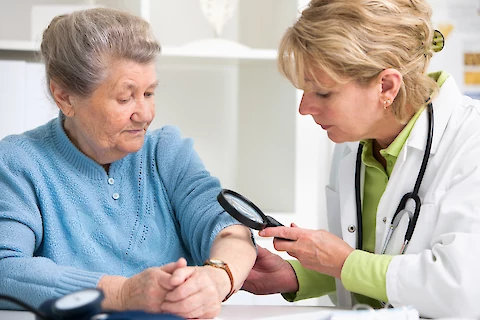
As we age, staying proactive about our health becomes increasingly important, and this includes keeping an eye on our skin. Skin cancer is a concern for many seniors, so having regular screenings is crucial for early detection and treatment. Maintaining skin health involves not only avoiding dangerous UV exposure but also going through regular skin cancer screening.
National/International Average for Skin Cancer Screening
As a general recommendation, seniors aged 65 and older should have a skin cancer screening every year. This guideline is based on the increased risk of skin cancer in older individuals, as well as the potential for age-related changes in the skin that make it more susceptible to damage. Regular skin cancer screening is essential for early detection and treatment. Skin cancers detected at an early stage are usually more treatable and have a better prognosis.
Factors Requiring More Frequent Screening
Several factors could necessitate more frequent skin cancer screenings for seniors.
1. Common Risk Factors
A family history of skin cancer, personal history of skin cancer, fair skin, light hair, light eyes, and a large number of moles or atypical moles can all increase your risk of developing skin cancer. If you have one or more of these risk factors, it's important to talk to your healthcare provider about how often you should be screened.
2. Environmental Factors
Sun exposure plays a significant role in the development of skin cancer. Seniors who spend a lot of time outdoors or live in sunny areas should be particularly vigilant about protecting their skin from the sun's harmful rays. They may need more frequent skin cancer screenings.
3. Age-Related Factors
As we grow older, our immune systems weaken and our skin becomes thinner. These make us more susceptible to certain types of skin cancer. This makes it even more critical for seniors to stay on top of their skin health and get regular screenings.
Why Seniors Need More Frequent Screenings
There are several reasons why seniors may require more frequent skin cancer screenings than their younger counterparts. First and foremost, the risk of skin cancer increases with age. This is primarily due to the cumulative effects of sun exposure over the years. The more time we spend outdoors throughout our lives, the greater the risk of developing skin cancer.
In addition to this, the natural aging process leads to changes in the skin that can make it more susceptible to damage. Thinner skin, along with a weakened immune system, can make it more difficult for the body to repair damage caused by the sun's rays, increasing the risk of skin cancer.
Lastly, seniors are more likely to have one or more risk factors for skin cancer, further emphasizing the importance of regular screenings.
How to Protect the Skin and Reduce the Risk of Skin Cancer
Taking steps to protect your skin from the sun is vital in reducing your risk of skin cancer. Here are some tips to help you do just that:
- Always wear sunscreen with an SPF of at least 30, even on cloudy days.
- Wear protective clothing, such as long sleeves and a wide-brimmed hat, when spending time outdoors.
- Seek shade whenever possible, especially during the sun's peak hours of 10 a.m. to 4 p.m.
- Wear sunglasses that block both UVA and UVB rays to protect your eyes and the delicate skin around them.
- Perform regular skin self-exams to check for any changes or new growths and report them to your healthcare provider as soon as possible.
- Avoid using tanning beds and sunlamps, which can increase your risk of skin cancer.
Seniors should aim for yearly skin cancer screenings, while also taking into account personal risk factors and environmental influences that may call for more frequent appointments. Early detection and treatment are critical in battling skin cancer. Don't hesitate to reach out to your healthcare provider if you notice any changes in your skin.
Seniors May Need More Assistance With Sunscreen and Sun Care
For seniors in the Elmira, Ithaca, Corning, Bath, and Watkins Glen areas, Senior Helpers Elmira-Ithaca is here to support basic in-home care needs, including offering help with sunscreen, sun care, and outdoor activities. Contact Senior Helpers Elmira-Ithaca today to learn more about our services.